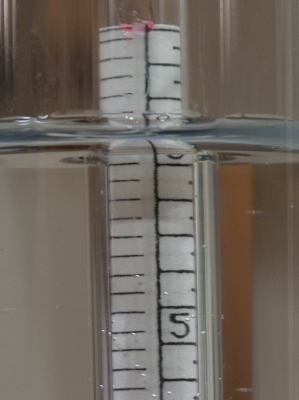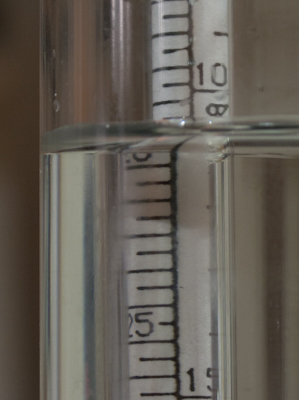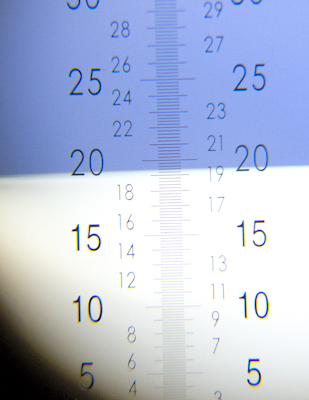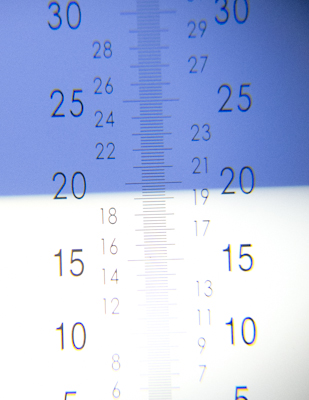I just learned that it is always a good idea to check the correction factor that applies to your refractometer. A commonly accepted correction factor for converting a refractometer’s Brix reading to a hydrometer Plato reading is 1.04. I was always under the impression that the Brix reading has to be multiplied with this value, which works for me, but Sean Terril pointed out to me that the commonly accepted formula divides the Brix value by this correction factor to covert to a Plato reading. (Refractometer Calculator)
Since my approach was working for me I had to check what’s going on here. I thus tested water, a 20 Plato sugar solution and a 20 Plato wort with both the hydrometer and my refractometer. All solutions and the refractometer had the same temperature.
The reason why my correction factor is different is that the scale on my refractometer is off. I.e. there is already a conversion factor for sugar water that is not 1. But since I checked my refractometer against my hydrometer at various wort gravities and found that Plato is Brix * 1.04 I can still use this refractometer in brewing.
BTW, the ATC of this refractometer is also broken. For every brewing session I have to re-calibrate it with water. Since this is done very quickly, it doesn’t bother me too much.
Conclusion:
If you buy cheap gear, check its calibration.








I had the exact same thing on my refractometer which confused me for a while until I tracked enough readings to be sure of it. Regarding the ATC, though, it’s not about keeping the calibration on the zero point. If your ATC wasn’t working or you used the refactometer outside it’s range you would just end up with bogus readings regardless of the zero point.
Dave,
If this type of error in the refractometer readings is more common than I thought, I wonder to what extent it is the reason that the refractometer correction formulas for measurements on beer are not working for some brewers.
As for the ATC. From what I have found out, the ATC mechanism shifts the scale up and down based on the temperature of the unit via a bi-metal strip. Hence simply calibrating the zero point should do the same thing. I think that’s what you would have to do on non ATC models.
I see the same problem on my new refractometer with ATC – at 20C 14.6Brix while the hydrometer shows ~15.2P; 13.0Brix and 13.5P at hydrometr. But the temperature of one drop of the wort could change very quickly, so it’s more reliable to let this drop to get cold.
But the temperature of one drop of the wort could change very quickly, so it’s more reliable to let this drop to get cold.
Refractometer has a manual calibration and is calibrated to exact 0Brix at 20C on distilled water; there’s no need to calibrate it every time.
ATC is not broken, it seems to correct the measurement to wrong direction
Probably it’s a common problem with cheap chinese refractometers.
Hm, I found your conversion table http://braukaiser.com/download/Kaiser_Brix_Plato_SG_table.pdf , and my results correspond it exactly…
I can hardly believe that correction is commonly made mistaken, but don’t see any reasonable explanation for such a phenomenon.
Yes, that conversion table multiplies the Brix reading with 1.04 to get to Plato.
I wonder how common these inaccuracies are?
I did something similar but in relation to hops. Found that dissolved hop solution throws off gravity readings taken from a refractometer…
http://sciencebrewer.com/2010/12/17/refractometer-experiment/
Cheers,
J
Jason,
I took a look at the write-up of your experiment and those are interesting results. Given the low concentration of hop oils and resins, I’m skeptical that they have the effect that you have shown. It could be that more evaporation occurred when you added the hops. You can easily compensate fort that by letting all the experiments cool and weigh them. Then add just enough water to compensate for evaporation. The scales I use might not be accurate enough for this, but I may give this a try.
But thanks for bringing this up.
Did you compare the final gravity by your refractometer and the hydrometer?
As for me, the refractometer reeding after the fermentation is completed seems to be lower then correct value, but the difference is less then [reading*0.08] (as works for OG).
And it’s unclear how this FG reeding can be corrected.